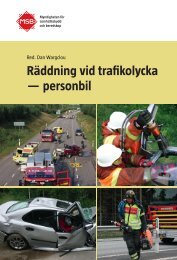One more last working class hero
One more last working class hero
One more last working class hero
You also want an ePaper? Increase the reach of your titles
YUMPU automatically turns print PDFs into web optimized ePapers that Google loves.
Despite admitting he bullshited senior officers when he was a firefighter, Arnold does not believe firefighters will<br />
deceive him him. This presumption by officers that they were still ‘in touch’ was a common response, and only one<br />
officer challenges this possibility:<br />
80<br />
Alan:<br />
People at my rank like to think they are. You go on stations, not to try and be part of it, but you let them<br />
know you were once part of it, but you get the impression that they are not suffering you. You get the<br />
impression that ‘he really doesn’t know what it’s like any <strong>more</strong>’. And I don’t think I do to be honest<br />
with you. … I get the impression that they tell you what they think you want to hear and they show you<br />
what they think you want to see.<br />
(BCC student). [My emphases].<br />
Alan’s minority view, suggesting that he expects firefighters to only show him what they judge he wants to see.<br />
Paradoxically this may mean he actually is in touch 178 . However, Alan’s colleagues appear to suffer the same deception<br />
that they effected on senior officers when they were firefighters. It may be implicit in Alan’s extract, but I will make it<br />
clear by adding that firefighters are only likely to show senior officers what they judge is safe to show them. Firefighters<br />
are also sufficiently mischievous to flaunt their disrespect for officers and deliberately provide them with information just<br />
to wind them up. The failure of officers to recognise this probability provides the evidence to suggest how out of touch<br />
officers may actually be. Officers’ almost omnipotent self-belief in their ability to remain in touch, is the other half of an<br />
argument firefighters make time after time: ‘Officers always believe that they have the ability to succeed where others<br />
have failed’.<br />
5.2.4. The view from the station: “all piss and importance”<br />
It would be unreasonable not to expect some resistance from firefighters to their officers. However, I was not prepared for<br />
firefighters’ vehemence, or the degree to which they would support Alan’s view. Christian explains just how inept senior<br />
officers might be at using shared understandings to relate to firefighters:<br />
Christian:<br />
The Deputy Chief comes down for a chat and I had a particular thing that I wasn’t happy about. And<br />
perhaps because I didn’t put it over to him correctly he snubbed me; cut me down yunnoo; shot me<br />
down in flames 179 . And at the end of it I thought I have wasted my time there.<br />
(Brigade one, leading firefighter 20 years’ service, age 38). [My emphasis].<br />
The view that officers did not like criticism, or were not listening is a common one. Pete, Fred and Patrick have a similar<br />
view to Christian:<br />
Pete:<br />
Fred:<br />
Patrick:<br />
You get a lot of them just don’t listen. They don’t want to know you. They are actually talking to yuh<br />
and you know that when you talk back they are not actually listening to yuh, yunnoo [laughter] … He<br />
just didn’t want to know, all piss and importance, you know what I mean … you soon suss them out and<br />
you don’t want to talk to them because you know it is a waste of time; not listening.<br />
(Brigade one, firefighter, 18 years’ experience, age 43). [My emphases and insert].<br />
I don’t know quite what it is when they get the white-shirt 180 on em. They loose touch with what the<br />
motors 181 are all about, what being a fireman’s all about.<br />
(Brigade one, firefighter, 15 years’ service, age 37).<br />
They seem to have missed the point somehow. They have moved up the ranks and sometimes they<br />
don’t always remember their roots, where they were, their job to the public.<br />
(Residential Fire Prevention Officer). [My emphasis].<br />
Firefighters’ argue that when officers don the “white-shirt” and dismissively show a lack of interest about what firefighters<br />
have to say about The Job, that officers have lost touch with “their roots … their job to the public.” Rather than increasing<br />
officers’ understanding, shared experience appears to be creating a distance between them and firefighters. It is almost as<br />
if the officers appear to ‘know better’ now they have a (middle <strong>class</strong>) white-shirt and that all they were part of before,<br />
when they were (<strong>working</strong> <strong>class</strong>) firefighters, is no longer relevant.<br />
178 It is interesting to note, after my earlier comments on ‘boat rockers’, that Alan’s promotion had stalled a number of years ago and his place on this<br />
prestigious course is seen by him as an opportunity to revitalise his career. I recognise in Alan something of the entrepreneur: an officer who traditional<br />
officers might think would rock the boat.<br />
179 This is a reference to the way that aeroplanes were shot down, as for example in the war.<br />
180 This is not a metaphorical use of language as in <strong>class</strong> structures but a reality. All ranks up to and including sub officers wear blue shirts and station<br />
officers and above have white shirts: a similar division exists with fire helmets with blue shirted workers having yellow helmets and white shirted<br />
officers have white helmets.<br />
181 ‘The motors’ as Fred describes them are the fire appliances, but his use of this phrase is probably better described by the work the appliances do and<br />
in my estimation he might just as easily used the words ‘The Job’.
















